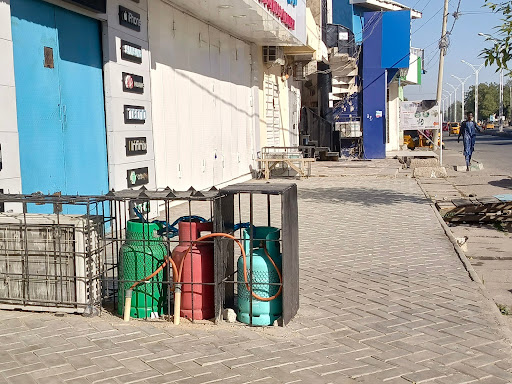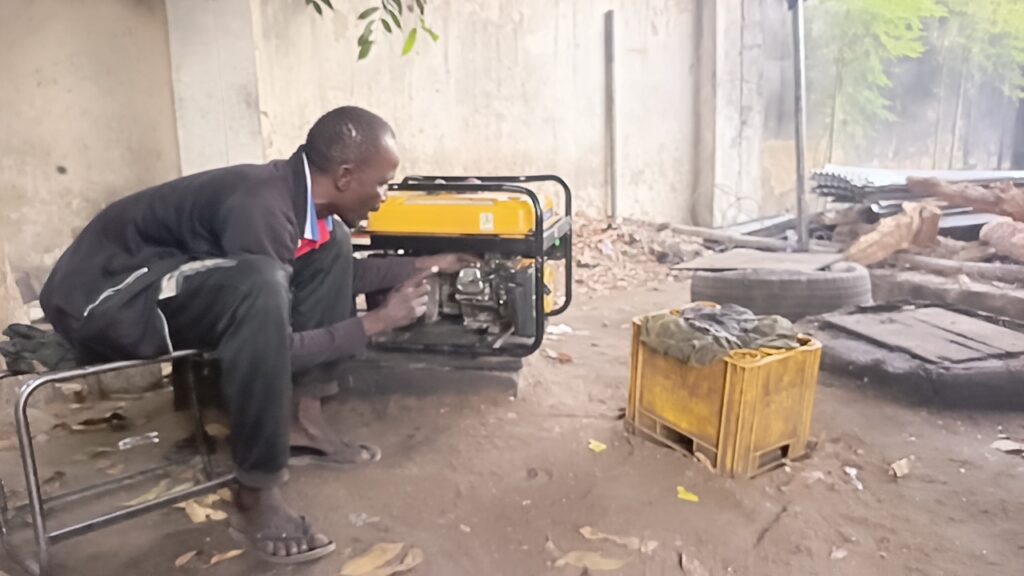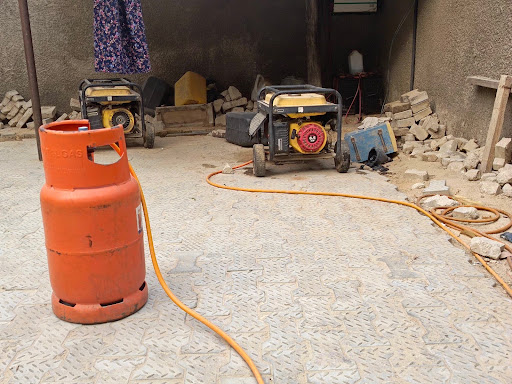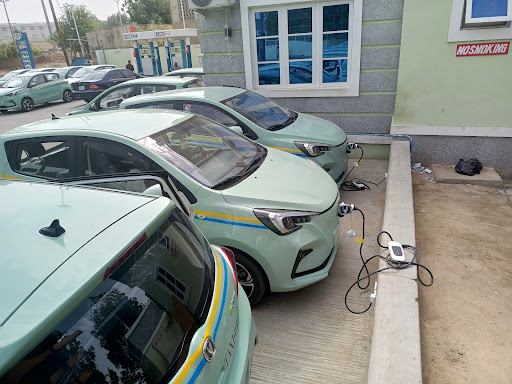
The English proverb ‘Necessity is the mother of invention’ best describes what is taking place at Ko’oma Adam’s generator repairs workshop. Situated in the Maiduguri Metropolitan Council area of Borno State, northeastern Nigeria, the place, formerly polluted by the smell of petrol, now buzzes with new innovations.
“When the fuel prices went up, we didn’t just see a problem; we saw an opportunity,” Adam told HumAngle. He went on to explain how converting Compressed Natural Gas (CNG) is now saving customers money spent on fuel and puts mechanics like himself in the driver’s seat of change.
Adam said the conversion was not rocket science, but it required the expertise of experienced technicians to couple it perfectly. It was also not easy convincing customers that it was a way out of the petrol crisis.
“When the idea first came to us, and we began to market it to our customers, people were sceptical, thinking that we were trying to lead them to fire disasters because of the high inflammability of the CNG, especially when it leaks. But we were able to convince them with practical examples of its safety, and gradually, it became a project everyone wants to embark on.”
Depending on the size of the generator, Adam said, each CNG carburettor came at different costs, with the least of its kind going for ₦15,000 (about $16.64).
“The conversion is not really that difficult, but it requires an expert to do it in order to avoid improper coupling that may lead to leakage and fire outbreak since we are dealing with highly inflatable fuel like gas,” Adam said.
When he purchases the gas carburettor, Adam first removes the petrol version, cleans the surrounding area where the new kit will be installed, and then fix it in place. The fittings and bolts are arranged in a similar manner, requiring adjustments as needed.
“After that, you’ll need at least an eight-metre-long gas pipe hose to ensure the gas cylinder is not positioned too close to the generator. It’s important to securely fasten both ends of the hose with clips to prevent gas leaks.”
Additionally, he ensures that the plug is well secured and covered with a suitable cap to prevent exposure of the wires. This is crucial to prevent potential sparks when starting the generator, as the gas carburettor requires the cylinder to be open for gas to circulate into the engine before starting. Leaving the plug unprotected could lead to a fire, although this is rare. This automatically renders the fuel tank useless because the fuel now comes from the cylinder.
“And when you want to put off the generator, all you need to do is lock the cylinder, and it goes off instantly,” Adam explained.

A spark of local ingenuity
Adam’s sentiment is shared by spare parts vendor Chibuzoe Okechi, whose business has surged with the rising demand for CNG conversion kits, which include the gas carburettor, a connection hose, and a gas cylinder.
“This change has been a boon for us,” Okechi said, adding that his shop is now often overcrowded with customers.
“We’re not just doing business; we’re helping people to safely wade through the economic hardship as well as being part of an environmental movement that aims to save the planet.”
Usman Aliyu agrees. As an environmental scientist whose organisation, Dark Green Leaves, plants thousands of trees annually to boost the go-green initiatives of the state government, he finds the initiative remarkable.
“It’s a move that’s saving money, cleaning the air, and catalysing local industry,” he said.
It is also about the environment
The transition to CNG in Borno State has reached homes and marketplaces. Aisha Garba, a restaurant owner, used to make use of firewood, but not anymore.
“The cost of firewood itself was choking our business of late due to the dangers involved in fetching them by fellers from the bushes,” she said. “We have been cautioned about the dangers of cooking with firewood, especially as they said it affects the weather and reduces rainfall for agriculture. Now, with CNG, we have significantly reduced cooking with firewood with the hope that it is contributing less pollution.”

Similarly, Ladi Okoye, a school principal, has overseen the conversion of her family’s generator to CNG. “The fuel hike was a shock, but converting to CNG has brought us relief,” Okoye notes. “It’s not just about economics; it’s about our health and the environment our children will inherit.
“In Borno State, a litre of fuel costs N700 (about $0.64). We need 10 litres to fill up our generator’s tank, which only lasts for two days. This means we spend ₦14,000 every week on generator fuel. However, a 12.5kg cylinder priced at ₦13,000 can power our CNG-converted generator for three weeks or more. This saves us money and produces near-zero carbon emissions,” said the mother of five.
“Adopting CNG is a strategic choice for our state,” Governor Babagana Zulum said during a recent budget presentation ceremony at the state House of Assembly. “By converting our public buses and partnering with NNPC to secure excess gas supply to the Maiduguri Gas Turbine Electricity Plant, we are setting a new standard for sustainable development in Borno.”
The governor announced that the Maiduguri Gas turbine, which was established in 2023 as a backup for electricity after the 2021 Boko Haram attack on the state’s power installation that left the state without power, only uses 50,000 cubic feet of gas daily, while the daily supply is 70,000 cubic feet.

“We plan to collaborate with the NNPC management to explore how we can utilise the extra 20,000 cubic feet of Compressed Natural Gas for our gas-powered vehicles,” Governor Zulum stated.
A new economy is birthed
The CNG conversion industry is not just an environmental win; it is also sparking economic growth and job creation across the state. Mechanics like Koma are making brisk business off the gas revolution, just as spare parts suppliers like Chibuzo Chike are expanding their operations to meet the growing demand.
“During the heat period when people in Maiduguri use more electricity, we get more customers coming to get the carburettors of their petrol generators converted to gas because they cannot sustain the imperatives of buying petrol at ₦700 a litre,” said Chibuzo, who deals in whole and spare parts sales of electricity generators.
Adam explained that despite the high cost of gas, with a 12.5kg cylinder of cooking gas selling at ₦13,000 ($11.80), it remains significantly more affordable compared to petrol.
“An amount of ₦14,000 can only purchase 20 litres of petrol. For a small business heavily reliant on generators, an average daily usage can be five litres or more. For a household needing to power their generator for at least five hours daily, 20 litres will last for about four days. However, with gas-powered generators, a 12.5kg cylinder can last for ten days to two weeks,” he explained.
Musa Gana, who runs a local printing shop, almost gave up on his business. “The petrol price hike nearly closed us down,” he said. “But since converting to CNG, we’re back in business and breathing easier.”
For Nana Yakubu, a young entrepreneur running a small fashion boutique, the shift to CNG has been a game-changer. “With the savings from using CNG, I can invest more in my business and even expand,” she said with a glint in her eyes. “It’s empowering to know that we’re not just adapting; we’re thriving.”
Challenges
Despite the relief brought by the petrol-to-gas conversion for many residents, there are still challenges associated with its use. Ladi shared her thoughts with HumAngle, expressing concerns about the recent hike in gas prices per kilogram.
“This increase has made it difficult for many to afford running gas generators,” she noted. “While using gas is not as expensive as petrol, the duration it lasts has decreased due to the rise in gas prices. Safety is also a primary concern.”
Ladi emphasised the need for utmost care during the conversion process to prevent mishaps, stating, “For now, I can’t ask my kids to help with the generators. I have to do it myself to avoid any accidents. The costs and safety risks associated with these conversions are significant challenges.”
Support Our Journalism
There are millions of ordinary people affected by conflict in Africa whose stories are missing in the mainstream media. HumAngle is determined to tell those challenging and under-reported stories, hoping that the people impacted by these conflicts will find the safety and security they deserve.
To ensure that we continue to provide public service coverage, we have a small favour to ask you. We want you to be part of our journalistic endeavour by contributing a token to us.
Your donation will further promote a robust, free, and independent media.
Donate HereStay Closer To The Stories That Matter




